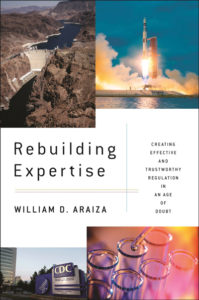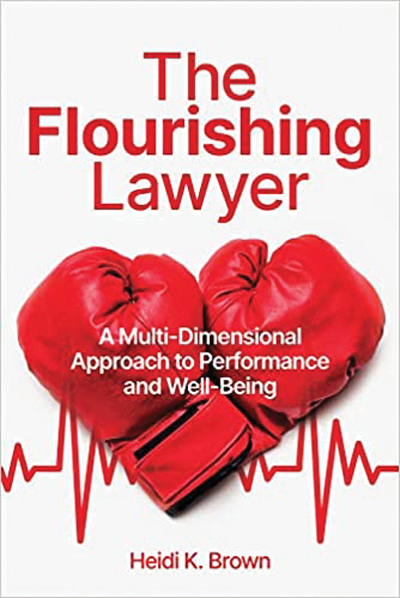To learn more, visit www.brooklaw.edu/facultyscholarship →

Rebuilding Expertise: Creating Effective and Trustworthy Regulation in an Age of Doubt (NYU Press, 2022)
Americans’ trust in public institutions is at near historic lows and “bureaucracy” and “big government” are pejorative terms. Araiza investigates the sources of this phenomenon and explains how we might rebuild trust in our public institutions. Using an interdisciplinary approach, with insights from history, political science, law, and public administration, Araiza explores our current bureaucratic malaise and presents a road map to finding our way out of it, toward a regime marked by effective, expert regulation that remains democratically accountable and politically legitimate (see Professor Araiza discussing his book at the Brooklyn Book festival).

The Flourishing Lawyer (ABA Book Publishing, 2022)
The Flourishing Lawyer offers an empathetic guide for members of the legal profession to cultivate their personal and professional well-being, identify and develop their individual strengths, and define success on their own terms. Drawing from lessons and research from the fields of psychology, health care, sports, and medicine, this book is an affirming guide to becoming a better contributor to the profession while living a flourishing life (see “Flourishing” in the Field of Law”).
Filing While Black: The Casual Racism of the Tax Law, Utah Law Review_ 801 (2022)
The tax law’s race-blind approach produces bad tax policy. The racial bias long tolerated—and sometimes exploited—by tax scholars and policymakers affects all aspects of the tax law. In 1986, Sam Gilliam was denied tax deductions that others in similar situations enjoyed. In 2000, Liberia was threatened with sanctions for being a tax haven, but Switzerland was not. In 2014, Eric Garner died in police custody after being suspected of evading a tax. In each instance, anti-Blackness played a role in ways the tax law either ignores or actively leverages.
The Place of the Prosecutor in Abolitionist Praxis, 69 UCLA Law Review 164 (2022)
Progressive prosecutors have been widely hailed as the solution to mass incarceration, but Godsoe argues they are not the magic bullet. Prosecutors’ institutional power and ethical mandate to “do justice” can be repurposed to start reversing decades of building the carceral state, but transforming the system entails ceding power to communities, divesting criminal system resources, and investing in societal supports that keep people safe.
Rights Retrenchment in Immigration Law, 55 UC Davis Law Review 1283 (2022)
The modern Court’s stance toward immigrants tells a story of rights retrenchment, a scaling back from even the modest gains of the 20th century. In areas including the right to habeas corpus, procedural due process, discrimination, free speech, and detention, noncitizens today enjoy even fewer constitutional protections than they did at the end of the last century.
Unaccommodated: How the ADA Fails Parents, 110 California Law Review 1315 (2022)
Thirty years after Congress passed the Americans with Disabilities Act (ADA), discrimination and ingrained prejudices against individuals with intellectual disabilities, especially poor Black and brown parents, continues. Despite federal intervention with the promulgation of the new technical assistance in 2015, both family and federal courts fail to vindicate the rights of parents with disabilities, by sidestepping responsibility for their ADA claims. For the ADA to fulfill its promise, parents must have viable legal avenues to enforce it.
Shifting Burdens at the Fringe, 102 Boston University Law Review 1301 (2022)
RAGHAVAN OFFERS a new descriptive account of consumer financial regulation. Leveraging insights from the recent literature on the legal design of money, he suggests that consumer financial regulation is best understood as a way to shift the incidence of financing the creation of new money and not as an intervention in private exchange. He considers how this framing can change the way we justify consumer law and regulate consumer credit markets.
Splitting the Baby, 61 Columbia Journal of Transnational Law _ (forthcoming 2022)
COMPROMISE AWARDS in international commercial arbitration are widely condemned, but it is hard to articulate what is wrong with such awards if tribunal members genuinely disagree about the law or the facts. This article argues that the primary harm of compromise lies in its effects on the quality of individual and collective deliberation. These flaws, in turn, taint the award by turning reason-giving into an exercise in justification rather than an opportunity for continued assessment.